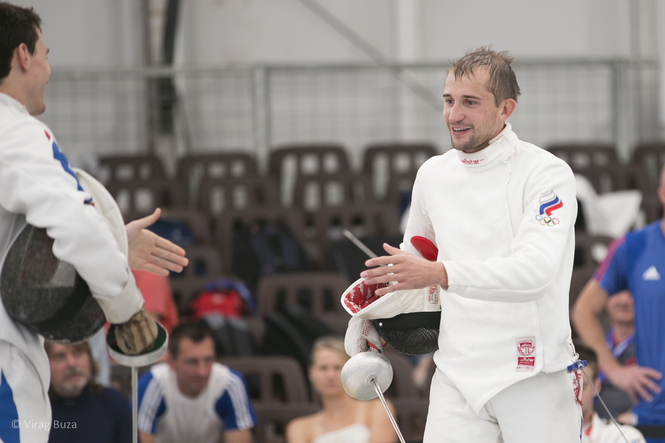My world records: Alexander Lesun (RUS)
In the second part of the series, the Rio 2016 Olympic champion reflects on how he broke not one but two men’s world records in Modern Pentathlon – and explains why records mean less to him than the raw satisfaction of winning.
Alexander Lesun of Russia has towered over the men’s Modern Pentathlon scene for a decade, a dominant presence ever since winning his first of five UIPM Pentathlon World Cup gold medals in Budapest (HUN) in 2010.
In 2016, having just turned 30, he snared the ultimate prize of Olympic gold in Rio de Janeiro after a masterful Fencing performance (28V/7D) that secured him another honour – a new Olympic record. But it was in 2014 when he was arguably at his competitive peak.
Lesun (RUS) won almost everything it was possible to win that year, and in the process set two scoring marks that have yet to be matched, six years on.
Q: In 2014, you broke the Modern Pentathlon world record with an overall score of 1,534 points in the UIPM Pentathlon World Championships Final in Warsaw (POL). What are your memories from that day?
A: I remember that day very well. It was cool, no doubt. It was my second individual victory at the World Championships. I also think that no one beat my record of 2014 in terms of the number of the victories (World Championships, European Championships, World Cup Final and one World Cup) all in 2014.

Q: In what ways did you perform better than other times when you have achieved a high score?
A: Good fencing, good horse, good shooting, peak of the form and good luck!
Q: When did you discover it was a new world record, and how did that feel?
A: I only had one, very pleasant and wonderful feeling – that I managed to do my work perfectly and professionally.
Q: Why is it so hard to score 1,500+ points in Modern Pentathlon?
A: Because we compete in different conditions: with different preparation and quality of horses, with different running courses (grass, sand, other terrains) and different conditions for shooting.
A very considerable role is played by the qualification and level of judges – especially in Fencing.
And one more point: we compete but we are not after the world record, this is not the main issue for us pentathletes. We are not paid for records, we do not get advertising contracts etc, therefore the number of points does not matter. The victory does.

Q: Also in 2014, you broke the Modern Pentathlon Fencing world record with a score of 286 (31V/4D) in the European Championships Final in Szekesfehervar (HUN). What are your memories from that day?
A: Oh, I do remember that day. It was my day!
During my sport career I have set many records – world, European, Olympic – but I never estimated their value, only the victory mattered.
Q: What is the key to a high score in Fencing – is it more of a mental or a physical challenge?
A: I can speak about Fencing always and endlessly. For me this is not just a sport. This is a true art. There are so many separate parts in it: emotions, physical form and many, many other factors.
Q: When did you start Fencing and which trainers helped you to reach such a high level?
A: I started Fencing at 16 and I must say that every coach working with me made his contribution in shaping my Fencing level of today. But the biggest and utmost role was played by my tutor, Alex Khaplanov, of course.

Q: How does it feel when you have a good day on the Fencing piste? Do you feel invincible?
A: I think that many people have a wrong impression of Fencing in Modern Pentathlon. We competitors, pentathletes, have known each other for many years and know everything, every detail. Therefore the task is to outwit your opponent for one minute. A huge role in our Fencing is luck: we are competing for one hit! And taking all this into account, I have a feeling of a certain game on the piste. Fencing for me is kind of mobile chess.
Q: Which Pentathlon disciplines have you found easiest over the years, and which one has taken the most training to develop?
A: I love all the five disciplines and all five required a great effort from me.
Q: During the Coronavirus (COVID-19) crisis, what have you been doing to stay physically and mentally sharp?
A: Since during the season we normally have very little free time, during quarantine I enjoyed many things which I could not afford before – my music, books, movies … and of course I tried to keep myself in shape and trained at home.
Q: Did you set any goals for the 2020 season (now deferred to 2021)?
A: Though we are not fully sure that the Olympic Games will take place in 2021 but we remain hopeful, my goals are as ambitious as they were for 2020.
Q: Do you feel any pressure about being the defending Olympic champion in Tokyo?
A: No, not at all. And it will not press me next year. In the course of the past five years the balance of power has considerably changed. And my title today is nothing but a good experience.




